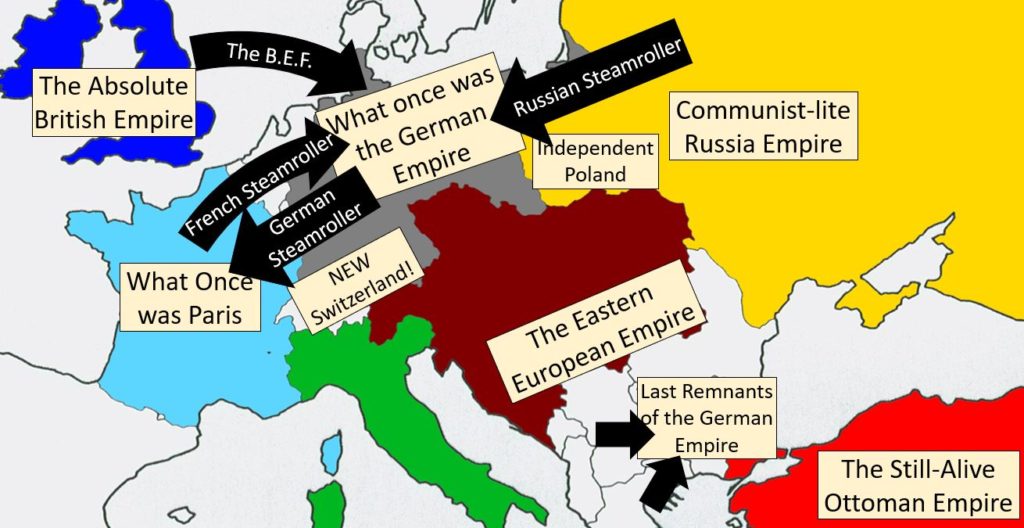
We had the pleasure of working with a driven group of undergraduates at the University of Minnesota Yelling for History Club to put on a pre-World War I era megagame. The cooperation sprung out of our popular previous event, where several members of the club personally witnessed the dissolution of the Rusviet Union and the re-emergence of the Byzantine Empire. We choose the pre-WWI era mainly because I personally am fascinated with the era, but also, the era is ripe for exploration in historical counterfactuals. In an era of constantly shifting web of geopolitical alliances, the only certainty was that France & Germany were not likely to get along.
We reached out to other UMN students student groups that we thought might enjoy the experience – which worked great in terms of getting the word out. We ended up hitting roughly 56 people (we forgot to count) with representatives from Model UN Club, Dungeons & Dragons Club, Board Game Club, and other History Clubs. We also had a couple observers, including my mom (hi mom!) and an ex-UN negotiator and expert in Balkan History – which was particularly neat. Overall, the game was a great success. Below is a summary of the player feedback, where players were asked to rate how much they agree with statements on a scale of 1 to 5.
| Player Feedback Statements | Average Player Rating (out of 5) |
| I had fun! | 4.84 |
| The rules were easy enough to understand | 3.65 |
| I would recommend this to a friend | 4.65 |
| Based on this experience, I am more likely to attend a similar event in the future | 4.74 |
The Gameplay
The gameplay is based on the well-established National Security Decision Making System (NSDM) which evolved from the academic wargaming going on at the US Naval War College. The NSDM system is maintained and continued by a travelling group of retired foreign policy experts and diplomats who travel the convention circuit. If you’re the type to travel to board game or wargaming conferences, I can’t recommend their events more highly.
In NSDM-style games, players receive role nametags which bullet what other people know about them on the front and detail their motivations more in depth on the back.
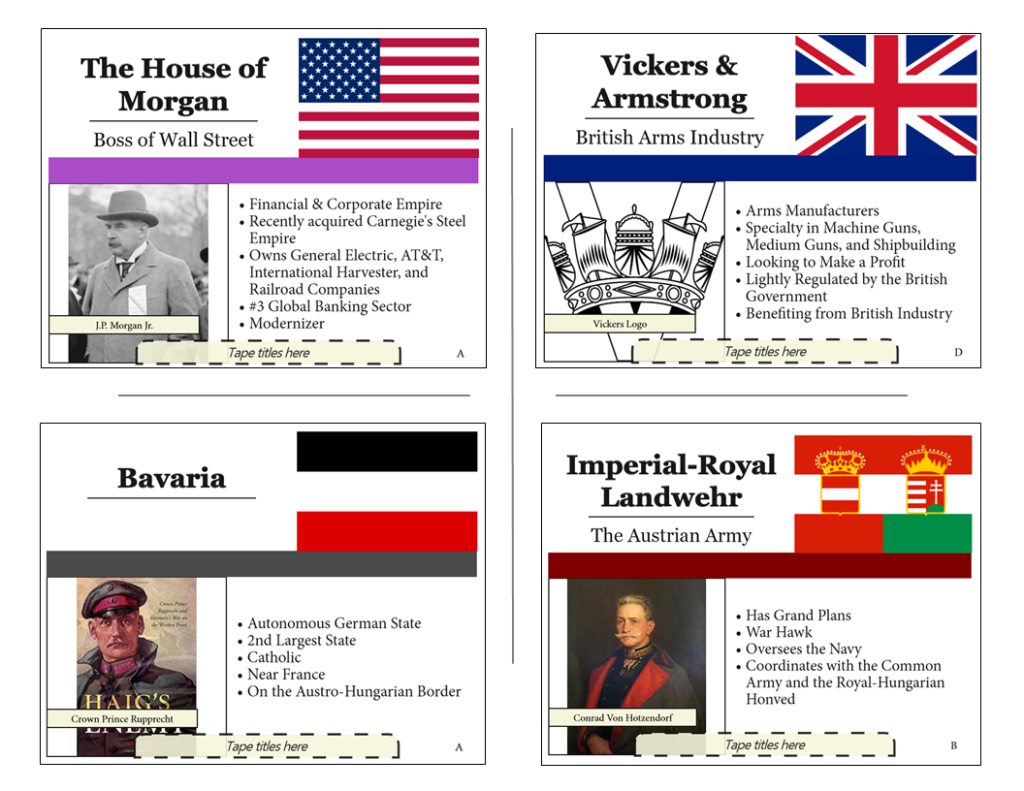

Players do things through a fairly intuitive initiative system. Initiatives are written out but aren’t valid unless all the parties who would have influence in said initiative sign off it. For example, military force can’t be deployed without the general’s signature; a nations’s chief financial authority has to sign off on all tax policy changes, etc.
In addition to the NSDM-based roles and initiatives, we also had a military system to keep track of army and navy sizes and adjudicating battles. This system was slowly abandoned through the game in favor of a more ad-hoc scenario – luckily enough the players were on the same page as the moderators and largely understood how in flux everything was.
Players were sorted into seven groups, consisting of six of the Great Powers of Europe and one group representing a number of minor powers. Each of the teams had a single moderator which adjudicated initiatives turned in by the players of that team. Moderators then informed each other of initiatives which may affect other countries..

We aimed to have a crisis every turn and started off the game by introducing an arms race mechanic. This was one of the only rigid mechanical parts of the game and it had nations choosing to increase the sizes of their army or navy or reduce their ‘economic strain’. All three variables, a nation’s army, navy, and economic strain were abstracted and represented in poker chips. The system itself while good in theory, will likely be ditched in future games due to a ‘loss in translation’ between having stored military strength and military strength deployed on the field, which caused an administrative headache for players & moderators.
Last, to provide feedback to the players and to focus players on particular crises, the moderators projected news alerts through some beautifully designed software by Jed Limke from Prairie Fire Games.
The Storm Before the Storm
Almost immediately, a flurry of initial declarations of friendship and economic free trade agreements lit up our alliance white board, where we tracked international relations (via different colored white board markers) – especially involving the minor powers. Military alliances and mutual defense pacts were slower to emerge as teams were more hesitant to get dragged into prolonged military engagements. We also told players the Great Powers couldn’t declare war on each other for the first four turns, in order to give some breathing room for the diplomats to lay some ground work.
The Minor Power players were particularly motivated and unlike the larger Great Powers, didn’t need to reach consensus in order to act. Belgium and the Netherlands quickly made sure France and Germany weren’t going to invade each other via their homelands. With their greatest foreign policy goals quickly and anti-climatically achieved, they proceeded to scheme the rest of the game. The Netherlands hosted the Olympics, held a suspiciously militarized ‘Chocolate Festival’ which started the Great European Chocolate Race, and then became a state of the United States (Only got a half-star on the flag). Belgium (who also represented Luxemburg) smuggled guns to Russian Revolutionaries and then proceeded to build a nation-long tunnel between France and Germany so they could go to war without messing up the place. If these shenanigans sound insane, you’d be right! This level of ridiculousness was hilarious but definitely exceeded the tone we were shooting for. I don’t think we’ll have Minor powers in further iterations of the game. They simply have too much power over the narrative and tone. Either way, they definitely made the game more hilarious and the various groups involved in these schemes certainly enjoyed them.

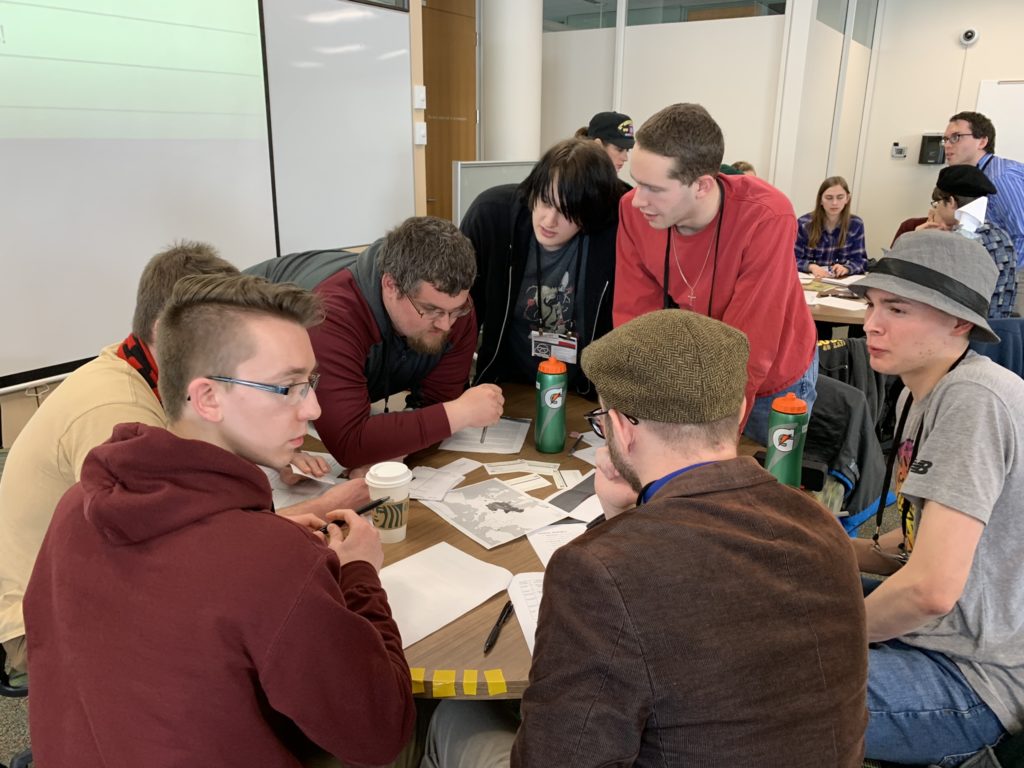
A naval standoff occurred when the Russians attempted to move their Black Sea Fleet into the Mediterranean. The British influenced the Ottomans to resist but the Ottomans weren’t super enthused to be carrying out the will of the British. Activist French players proceed to decree a summit, but the naval issue continued to dog foreign policy for the rest of the game. This effort was a part of France’s full blown diplomatic and cultural offensive, which also included a World’s Fair and some supreme innovations in the Great Chocolate Arms Race – much to the chagrin of their fellow competitors, the British and Germans.
On the other side of Europe, the Austro-Hungarians were undertaking their own diplomatic offensive. Internally, they decided to solve the various minority issues by instituting full emancipation. This was a megagame designers’ nightmare of “peace breaking out”, as a lack of internal tension could lead to a single team being overpowered relative to other, more divided teams. However, although they had bypassed internal tensions, they still had to contend with the problem of being completely surrounded.

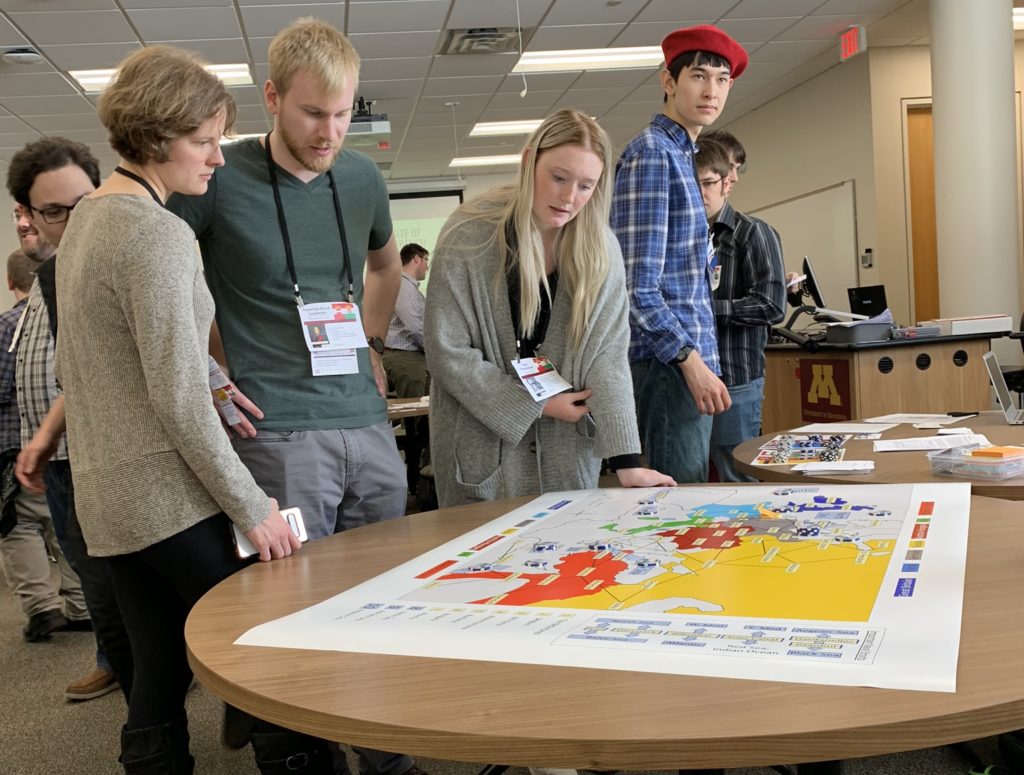
At about the mid-game, two simultaneous and independent revolutions broke out inside Imperial Russia and the Ottoman Empire. The Ottoman Revolution represented a moment of solidarity between the disgruntled parties of the Empire while the Russian Revolution was a foreign-backed affair of international intrigue. It appears Lenin had received the emotional endorsement of the socialist/communists who had arisen in France and the Anti-Russian Hawks of Germany. Capitalizing on this, the Russian Poles declared independence from both the Tsarists and the Revolutionaries and secured international recognition from Great Britain, the Austro-Hungarians, and others.
While I was planning on elongating the conflict to multiple turns to allow for the chance for foreign and internal factions to respond and scheme, both the Russians and Ottomans immediately hunkered down for an internal diplomatic end to the revolts. The Arab-led Coalition of disgruntled minorities settled down in return for greater autonomy, democratic reforms, minority protections, and the access to regional government positions. In Russia, the Russian factions settled on a new constitutional monarchy setup under the Grand Duke (ousting the Tsar) with Lenin as Prime Minister. This new government had non-specific economic policies and appeared by-and-large to not be very different from the previous government. The revolts were a mere flash from a time perspective but many of the Ottoman and Russian players highlighted those moments as their favorite from the game. The revolts also importantly kicked off the cascading series of invasions that solidified the end of the German Empire.
Germany up until this point had been cycling through Prime Ministers as the Kaiser (and team moderator) reshuffled the cabinet whenever the previous PM failed to live up to the absurd demands of the Kaiser or utter something about progressive income taxes. This periodic reshuffling along with the break-neck speed of the game led to a lack of consistency in foreign policy and a number of incidents where activist Prime Ministers got away with acting unilaterally instead through team consensus. This will be monitored and tightened for future games, but admittedly led to exciting results!
Despite the Kaiser, Germany’s future looked promising. France seemed content with winning the Chocolate War and Russia was in disarray. Germany further succeeded in convincing the other major powers to allow them to annex Luxembourg. They also secured a mutual defense pact with the Ottoman Empire and incorporated Bulgaria into the German Empire as a junior partner (later discovered to be a unilateral move by the PM at the time).

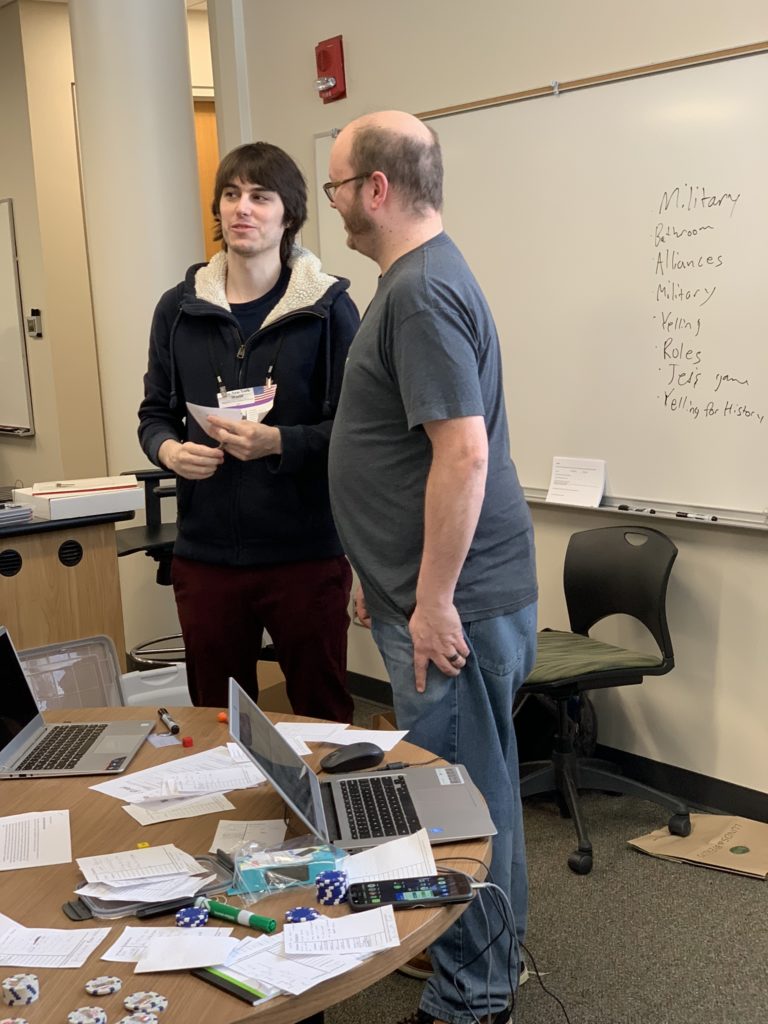
The Final Showdown
Capitalizing on the Arab Revolt, Bulgaria decided (with tacit German-backing) to invade the last remaining European part of the Ottoman Empire. This led for the remaining major Balkan powers to promptly invade Bulgaria (reenacting the Second Balkan War). The Bulgarian forces called off their invasion as the Arab Revolt calmed down and German Reinforcements arrived to fight off a Greco-Serbian invasion.
This was right about the time when the ‘Quadruple Entente’ was formally announced. The French and Austria-Hungarian-led initiative solidified a military alliance between France, Great Britain, Russia, Austria-Hungary, and several cooperating minor partners – including the independent Poland and Romania. The Quad Entente sensed the opportunity and immediately invaded Germany. Tangentially, this is the same time Great Britain decided unanimously to restore the absolute monarchy, granting absolute power to the profoundly surprised King George.
Facing invasion on most sides and an internal socialist revolt (long-brewing), the minority states of Bavaria & Saxony defected – founding New Switzerland. The remaining Prussian factions decided to go down with ship and launched an all-out invasion of France.
France launched a counter-invasion via a German-constructed underground tunnel underneath Belgium (Belgium was playing both sides). Britain launched a full-blown naval invasion of Northern Germany and Russia launched a full-blown invasion of the undefended Eastern Germany. The Ottoman Empire, bonded to Germany by a mutual defense pact, decided not to honor the agreement but did politely apologize. Germany seemed to understand.
The game ended with the German Army deep into France and French, British, and Russian Armies deep into Germany (the Austro-Hungarians decided to stay on the defensive). The German-Bulgarian forces in the Balkans were setup to fight off the Serbians, but it didn’t look good in the long-run for these Balkan Holdouts.

The Austro-Hungarians closed the game by announcing the death of Emperor Franz Joseph I, the ascension of Archduke Franz Ferdinand, who proclaimed the new Eastern European Empire, which consisted of the old Austro-Hungarian lands as well as Serbia and Romania.
Improvements for next time
The biggest improvement from this game to the next will be the straight-forward fact that many of the moderators will have experienced this type of game previously. It was the first time being a moderator for 5/8ths of the team. On the whole the moderator team did great, and with a notch on their belt, will do even greater next time!
Major Improvements
- The military system was not realistic for a game of this speed, focus, and scope. Either the arms race/military game needs to be changed or the rest of the game needs to be pivoted to focus more exclusively on the military aspects of the game.
- The Minor Powers will be eliminated or turned into multi-person teams. As individuals, they had far too much power over the narrative and tone of the game. Additionally, their foreign policy goals were often either too-easily accomplished or drastically too hard.
- Upon witnessing exactly how much chaos was already going on in the game, the moderators quickly and instinctually decided not to introduce internal, country specific crises. This was a big mistake! Instead of the player vs. player dynamic I was striving for, many of the teams functioned as single units. Further, many philosophies of various political factions remained untested.
- After reflection, we’ve decided to heavily change the Ottoman Empire team for future events. The goal of the design was to make the player factions be as historic as possible. This led to a number of design problems as the late Ottoman Empire is mired in genocide. Before the game, the Ottoman Empire received the most attention from players and was the faction to sell out first. I think this is due to the exciting foreignness of the Ottomans to most Western-oriented Americans coupled with an unawareness of (1) how historically accurately we wanted the game to be and (2) how genocidal the leaders of the Empire were. It put players in a tough spot, because no one wants to be a genocidal maniac.
- Most of the moderators in this event also represented actual people (usually the monarchs of the country). This had mixed results and will most likely be ditched in future games. Players don’t want to talk to their moderators about overthrowing the Tsar if the moderator IS the Tsar.
Other improvements include
- Prewritten rules, maps, and other player aids
- Moderators should utilize their nearby white boards to make notes. This is a great and easy way to provide feedback to players of the nation.
THANKS!!!
This was a great experience and I’m happy with how it turned out. Thanks to Alex, Rory, Brent, Trenton, Evan, Alec, and David to helping my strange dream of reenacting the onset of World War I and to all the student groups that came out for the event! We’ll be hoping to do more of these large-player events in the future.

Sign up to the Yelling for History Listserv for updates on future projects. I also recommend coming to the weekly Yelling for History events during the semester if arguing about when the appropriate time to assassinate Hitler is your type of thing.
Outside the University, Minnesota Megagames will be running Sickle: A Scythe Fan-Made Megagame in Fargo, ND on June 8th with all proceeds going to the Extra Life Charity (read a breakdown of a previous game here). We’ll also be putting on several events at Gen Con 2019.
Below are downloadable files for the pdf of the nametag fronts used for this activity and a pdf of the map utilized as well. Feel free to reach out if you’re curious about the system or want to see more of the materials.
